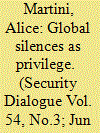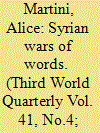|
|
|
Sort Order |
|
|
|
Items / Page
|
|
|
|
|
|
|
| Srl | Item |
| 1 |
ID:
186123


|
|
|
|
|
| Summary/Abstract |
The dynamics of the Syrian war have been surrounded by discursive moves of delegitimisation and legitimisation of the parties involved – above all, the Syrian government. Here, on the one hand, Western countries such as France, the United Kingdom and the United States have discursively attempted to delegitimise the Syrian government and its position within the international community. On the other hand, Syria, Russia and China have discursively rejected these processes and discursively reaffirmed the Syrian government’s legitimacy as sovereign – understanding sovereignty as the nature of a legitimate government. These opposite positions gave rise to discursive clashes in the United Nations Security Council.
|
|
|
|
|
|
|
|
|
|
|
|
|
|
|
|
| 2 |
ID:
190679


|
|
|
|
|
| Summary/Abstract |
Silences are not only absences in the spoken discourse or gaps in the discursive texture of international politics. They are important nodes of this texture and, as such, they constitute the political too. The said and the unsaid may work together to reify knowledge and shape international politics. Starting from this idea, this article scrutinizes global counter-terrorism as a discursive formation, composed of a spoken and an unspoken sphere. Within the silent dimension, the work focuses specifically on the silences in far-right terrorism and extremism. Scrutinizing global counter-terrorism as a racialized formation, the article argues that these silences are produced and reproduced by whiteness. Within the international community’s debates, whiteness gives rise to two kinds of silence – silence as the unspoken and the spoken as silencing. Examining them through the prism of whiteness, the article shows that these silences allow the maintenance of white privilege. This is the privilege of not being identified as a terrorist Other and not becoming the object of counter-terrorism measures, while having this privilege silenced and hidden. This work thus shows that, as gears of discursive formations, silences are racialized and may have colors – in this case, the color of white privilege.
|
|
|
|
|
|
|
|
|
|
|
|
|
|
|
|
| 3 |
ID:
158925


|
|
|
|
|
| Summary/Abstract |
By analysing Boko Haram and Al-Qaeda in the Islamic Maghreb, this article argues that ascriptions to international jihadist brands are linked to local movements’ political economy and geopolitical imaginaries, and, therefore, driven more by contingent strategic considerations rather than by ideological motives. Consequently, three sets of evidence are discussed, by drawing also on fieldwork conducted in Mali and Niger from 2013 to 2016: the discourses of these actors; their political economies; their use of political violence. In conclusion, we analyse the ‘territorialised-deterritorialised cleavage’ and argue that this has greater heuristic value to understand African ‘jihadisms’ than existing categorisations of political violence.
|
|
|
|
|
|
|
|
|
|
|
|
|
|
|
|
| 4 |
ID:
171321


|
|
|
|
|
| Summary/Abstract |
This article presents a study of the ‘wars of words’ among selected parties involved in the Syrian conflict. Based on a combination of content analysis and critical discourse analysis (CDA), it examines actors’ discourses within the United Nations Security Council (2011–2015), the global arena of confrontation and international legitimisation of armed actions. Here, it investigates their instrumentalisation of the word ‘terrorism’ and the war on terror narrative, and it explores the dynamics of discursive (de)legitimisation of the use of violence in Syria. The article shows how parties instrumentalised this narrative to criminalise their enemies while legitimising their own violent actions. By doing this, the paper also offers a broader reflection on the global narrative on terrorism, and its different reception and instrumentalisation by core and peripheral actors.
|
|
|
|
|
|
|
|
|
|
|
|
|
|
|
|
|
|
|
|
|